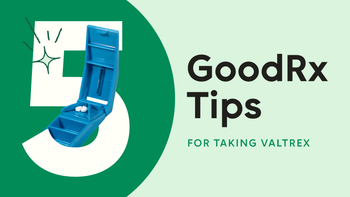
valacyclovir
Valacyclovir (Valtrex) is an antiviral medication used for treating infections caused by herpes simplex virus and varicella zoster virus, such as cold sores, genital herpes, and shingles, and chickenpox. It's available as a tablet. But it can be made by a compounding pharmacy into a suspension for people having trouble swallowing the tablets. Some more side effects of valacyclovir (Valtrex) include headache, nausea, and stomach pain.

Get your GoodRx coupon

What is Valacyclovir (Valtrex)?
What is Valacyclovir (Valtrex) used for?
Chickenpox (varicella) in children ages 2 to 17 years old
Cold sores in people age 12 years and older
Genital herpes in adults
Shingles (herpes zoster) in adults
How Valacyclovir (Valtrex) works
Valacyclovir (Valtrex) is an antiviral medication. When valacyclovir (Valtrex) gets absorbed into your body, it gets converted (changed) to acyclovir, another available antiviral medication.
Valacyclovir (Valtrex) works by preventing an important protein that's used to make genetic material (DNA) from working in the herpes simplex virus and varicella zoster virus. By doing this, valacyclovir (Valtrex) prevents the virus from making copies of itself and spreading.
Drug Facts
More on Valacyclovir (Valtrex) essentials

What are the side effects of Valacyclovir (Valtrex)?
Common Side Effects
- Headaches (up to 17%)
- Headaches (up to 38%)
- Nausea (up to 11%)
- Stomach pain (up to 11%)
- Nausea (up to 15%)
- Headaches (up to 14%)
- Diarrhea (5%)
- Fever (4%)
Other Side Effects
- Dizziness
- Runny nose and sore throat
- Menstrual cramps
- Joint pain
- Rash
Serious Side Effects
- Blood clotting problems: headache, confusion, dizziness, fever, bleeding in your skin, bruising, tiredness, stomach pain, blood in urine, making less urine
- Serious kidney problems: urinating less often than usual, swelling in your feet, ankles, or hands, unexplained weight gain
Source: DailyMed
More on Valacyclovir (Valtrex) side effects
The following side effects have also been reported
Along with its needed effects, a medicine may cause some unwanted effects. Although not all of these side effects may occur, if they do occur they may need medical attention.
Check with your doctor immediately if any of the following side effects occur:
More common
Discouragement
feeling sad or empty
irritability
lack of appetite
loss of interest or pleasure
tiredness
trouble concentrating
trouble sleeping
Rare
Black, tarry stools
chills
decreased frequency or output of urine
flu-like symptoms
headache
lower back or side pain
reduced mental alertness
shortness of breath
yellow eyes or skin
Incidence not known
Actions that are out of control
agitation
back, leg, or stomach pains
bleeding gums
blood in urine or stools
blurred vision
change in consciousness
change in mental status
changes in behavior, especially in interactions with other people
changes in patterns and rhythms of speech
dark or bloody urine
difficult or labored breathing
difficulty speaking
difficulty swallowing
dizziness
drowsiness
fast, pounding, or irregular heartbeat or pulse
feeling that others are watching you or controlling your behavior
feeling that others can hear your thoughts
feeling, seeing, or hearing things that are not there
general tiredness and weakness
hyperventilation
increased thirst
lightheadedness when getting up from a lying or sitting position
light-colored stools
loss of consciousness
mood or mental changes
nervousness
pale color of skin
pinpoint red spots on the skin
pounding in the ears
puffiness or swelling of the eyelids or around the eyes, face, lips, or tongue
redness of the skin
restlessness
seeing, hearing, or feeling things that are not there
seizures
severe mood or mental changes
shakiness and unsteady walk
shakiness in the legs, arms, hands, or feet
skin rash
slurred speech
sores, ulcers, or white spots on the lips or in the mouth
stiff neck
swelling of the face, fingers, or lower legs
swollen or painful glands
talking, feeling, and acting with excitement
tightness in the chest
trembling or shaking of the hands or feet
trouble in speaking
troubled breathing
unsteadiness, trembling, or other problems with muscle control or coordination
unusual behavior
unusual bleeding or bruising
unusual tiredness or weakness
upper right abdominal pain
vomiting
Some side effects may occur that usually do not need medical attention. These side effects may go away during treatment as your body adjusts to the medicine. Also, your health care professional may be able to tell you about ways to prevent or reduce some of these side effects. Check with your health care professional if any of the following side effects continue or are bothersome or if you have any questions about them:
More common
Body aches or pain
cramps
difficulty in moving
ear congestion
loss of voice
muscle aches
muscle pain or stiffness
pain in joints
stuffy or runny nose
Incidence not known
Blistering, peeling, or loosening of the skin
hair loss or thinning of the hair
hives or welts
increased sensitivity of skin to sunlight
red, irritated eyes
redness or other discoloration of the skin
severe sunburn
Other side effects not listed may also occur in some patients. If you notice any other effects, check with your healthcare professional.
Call your doctor for medical advice about side effects. You may report side effects to the FDA at 1-800-FDA-1088.

Pros and cons of Valacyclovir (Valtrex)

Pros
Available as a lower-cost generic
Can be used in adults and children for cold sores
Can be made into an oral liquid by the pharmacy for people having trouble swallowing the tablets
Not many interactions with other medications

Cons
Doesn't cure viral infections
Still have risk of future outbreaks
Only works well if taken at the first signs of infection
Older adults at higher risk for some side effects, such as agitation or confusion

Pharmacist tips for Valacyclovir (Valtrex)

Valacyclovir (Valtrex) works best if it's started at the first sign of an infection. If you're prescribed valacyclovir (Valtrex), start the medication right away without delay so it can work as best as possible to treat your infection and symptoms.
Make sure to drink enough fluids to stay hydrated while taking valacyclovir (Valtrex) because this can help prevent rare, but potentially dangerous kidney problems.
Take valacyclovir (Valtrex) exactly as prescribed. Make sure to finish your treatment course, even if you're feeling better. Stopping the medication earlier than prescribed can make your infection come back and become harder to treat.
Valacyclovir (Valtrex) can be taken with or without food. However, nausea and stomach pain are common side effects. If it's upsetting your stomach, try taking it with food to help.
If you're unable to swallow the valacyclovir (Valtrex) 1 gram tablet whole, you can break it in half along the scored line. Don't break the tablet if there aren't any scored lines. If you still have a hard time taking the tablets, ask your provider or pharmacist if you can be switched to the oral suspension (liquid).
If you or your partner is taking valacyclovir (Valtrex) to lower the risk of transmission of genital herpes, you're still recommended to use condoms during sexual activity for added protection. Also, avoid sexual contact if you or your partner have any signs or symptoms of an outbreak.
More tips for valacyclovir (Valtrex) oral suspension:
Shake the bottle well before using. Make sure to only use a medication dose cup or syringe from the pharmacy to measure out your dose. Don't use household spoons because they aren't accurate and might cause you to take the wrong dose.
The valacyclovir (Valtrex) oral suspension is compounded for you at the pharmacy. Once it's made by the pharmacist, the medication can be stored in the refrigerator for up to 28 days. After 28 days, please throw away the medication bottle, even if there's still some medication left.
More on Valacyclovir (Valtrex) tips

Frequently asked questions about Valacyclovir (Valtrex)

How to save using GoodRx




What are the risks and warnings for Valacyclovir (Valtrex)?
Valacyclovir (Valtrex) can cause some serious health issues. This risk may be even higher for certain groups. If this worries you, talk to your doctor or pharmacist about other options.

Rare blood clotting problems
Risk factors: People infected with HIV | People who received organ transplants | Taking more than 8 grams of valacyclovir (Valtrex) per day
Valacyclovir (Valtrex) can cause rare, life-threatening blood problems called thrombotic thrombocytopenic purpura (TTP) and hemolytic uremic syndrome (HUS). In clinical studies, these problems were seen in people who were infected with HIV and people with weakened immune systems who took more than 8 grams per day. Your provider might order blood tests to check your blood work while you're taking valacyclovir (Valtrex). Talk to your provider right away if you notice stomach pain, fever, bleeding, bruising, tiredness, or blood in your urine.

Kidney problems
Risk factors: Dehydration (not enough fluids in the body) | Older adults | Higher-than-recommended doses of valacyclovir (Valtrex) in people with kidney problems | Taking other medications that can cause kidney problems
Very rarely, valacyclovir (Valtrex) can cause serious kidney problems. This can happen to anyone, but the risk is higher for certain people, such as older adults and those taking other medications that can cause kidney problems. Make sure to drink enough fluids while taking valacyclovir (Valtrex). Let your provider know if you have any lower back pain, difficulty urinating, or swelling in your feet, ankles, or hands because these could be signs of kidney problems caused by valacyclovir (Valtrex).

Agitation, confusion, and other nervous system-related side effects
Risk factors: Taking higher-than-recommended doses of valacyclovir (Valtrex) and have kidney problems | Older adults
Valacyclovir (Valtrex) can cause agitation, confusion, hallucinations (seeing things that aren't real), or seizures. Talk to your provider if you or your loved ones notice any of these signs or symptoms while taking valacyclovir (Valtrex) because you'll likely need to stop taking the medication.

Valacyclovir (Valtrex) dosage forms
Typical dosing for Valacyclovir (Valtrex)
Cold sores
The typical dose is 2 grams by mouth twice daily (taken 12 hours apart) for 1 day.
Genital herpes
First outbreak: The typical dose is 1 gram by mouth twice daily for 10 days.
Repeated outbreaks: The typical dose is 500 mg by mouth twice daily for 3 days.
Outbreak prevention: The typical dosing range is 500 mg to 1 gram by mouth once daily, depending on the number of outbreaks you've had. For people who also have human immunodeficiency virus (HIV), the typical dose is 500 mg twice daily.
Lower risk of transmission: The typical dose is 500 mg by mouth once daily.
Shingles
The typical dose is 1 gram by mouth 3 times daily for 7 days.
Chickenpox
Your child's provider will determine their dose of valacyclovir (Valtrex) based on your child's body weight. The typical dose is 20 mg/kg by mouth 3 times daily for 5 days. The maximum recommended dose is 1 gram.
Your dose might differ if you have kidney problems.
More on Valacyclovir (Valtrex) dosage forms

Valacyclovir (Valtrex) Reviews
GoodRx has partnered with PatientsLikeMe to provide reviews on the different aspects of Valacyclovir (Valtrex).
Effectiveness
Learn more about the effectiveness of Valacyclovir (Valtrex) based on real life experiences.
Overall Rating
Based on 48 people taking this medication
3.5
Effectiveness by condition:
shingles (herpes zoster)19 reviews
3.8
herpes simplex virus infection13 reviews
3.4
cold sore (herpes simplex)7 reviews
4.6
genital herpes5 reviews
3.0
fibromyalgia4 reviews
2.5
Severity of side effects
Based on 94 people taking this medication
0%
50%
100%
Top side effects
Nausea
5%
Upset stomach
5%
Diarrhea
4%
Dizziness
4%
Jarisch-Herxeimer reaction
2%
Reasons people stopped taking Valacyclovir (Valtrex)
Based on 89 people who have taken this medication
Course of treatment ended
56%
Other
12%
Doctor's advice
11%
Side effects too severe
7%
Did not seem to work
6%
Expense
6%
Change in health plan coverage
5%
Personal research
2%
How long people take Valacyclovir (Valtrex)
Based on 235 people taking this medication
0%
50%
100%

Interactions between Valacyclovir (Valtrex) and other drugs
Using this medicine with any of the following medicines is usually not recommended, but may be required in some cases. If both medicines are prescribed together, your doctor may change the dose or how often you use one or both of the medicines.
Using this medicine with any of the following medicines may cause an increased risk of certain side effects, but using both drugs may be the best treatment for you. If both medicines are prescribed together, your doctor may change the dose or how often you use one or both of the medicines.

How much does Valacyclovir (Valtrex) cost?

What are alternatives to Valacyclovir (Valtrex)?
Chickenpox (varicella) in children ages 2 to 17 years old
Cold sores in people age 12 years and older
Genital herpes in adults
Shingles (herpes zoster) in adults
Cold sores (herpes labialis)
Genital herpes
Shingles (herpes zoster)
Oral capsule, tablet, and suspension:
Buccal tablet (Sitavig):
Ointment:
Cream

What is the latest news about Valacyclovir (Valtrex)?

Valacyclovir (Valtrex) images
Get savings updates for Valacyclovir (Valtrex)
Receive price alerts, news, and other messages from GoodRx about Valacyclovir (Valtrex) and other healthcare topics and relevant savings offers.By providing your email, you consent to receive marketing communications from GoodRx, which may include content and/or data related to men’s health, women's health, reproductive care, or sexual health. You agree to the GoodRx Terms of Use and acknowledge the Privacy Policy. You can unsubscribe at any time.
References
Best studies we foundCenters for Disease Control and Prevention. (2021). Herpes - genital (HSV) / adolescents and adults.
Centers for Disease Control and Prevention. (2022). About chickenpox.
Centers for Disease Control and Prevention. (2022). Genital herpes - CDC basic fact sheet.
Emmert, D.H. (2006). Treatment of common cutaneous herpes simplex virus infections. American Family Physician.
Fife, K. H., et al. (1997). Valaciclovir versus acyclovir in the treatment of first-episode genital herpes infection. Results of an international, multicenter, double-blind, randomized clinical trial. The Valaciclovir International Herpes Simplex Virus Study Group. Sexually Transmitted Diseases.
GlaxoSmithKline LLC. (2022). Valtrex- valacyclovir hydrochloride tablet, film coated [package insert]. DailyMed.
Kausar, S., et al. (2021). A review: Mechanism of action of antiviral drugs. International Journal of Immunopathology and Pharmacology.
National Heart, Lung, and Blood Institute. (2022). Thrombotic thrombocytopenic purpura (TTP).
Saguil, A., et al. (2017). Herpes zoster and postherpetic neuralgia: Prevention and management. American Family Physician.
Trachtman, H. (2013). HUS AND TTP. Pediatric Clinics of North America.
Usatine, R. P., et al. (2010). Nongential herpes simplex virus. American Family Physician.
Browse medications
View AllResearch prescriptions and over-the-counter medications from A to Z, compare drug prices, and start saving.


















